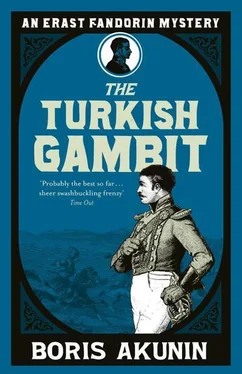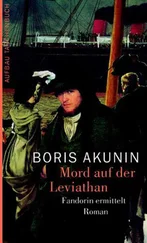'You t-talk too much, Lieutenant-Colonel.' Erast Petrovich's glance slid even lower, to the top button of the gendarme's uniform jacket. 'Personal ambition should not interfere with the p-performance of one's duty.'
'What?' Kazanzaki's swarthy face began twitching. 'You dare preach to me? Well now! I've had time to make a few inquiries about you, Mister Wunderkind. In the line of duty. And the character that emerges isn't exactly a highly moral one. Too sharp altogether, above and beyond the call of duty. Made a highly advantageous marriage, didn't you, eh? Doubly advantageous in fact - pocketed a nice fat dowry and still held on to your freedom. Very nice work indeed. My congrat—'
He never finished. Striking as deftly as a cat with its paw, Erast Petrovich swiped the palm of his hand across Kazanzaki's plump lips. Varya gasped, and several officers grabbed hold of Fandorin's arm, but immediately released it when he showed no signs of agitation.
'Pistols,' Erast Petrovich pronounced in a humdrum tone of voice, looking the lieutenant-colonel straight in the eye now. 'Immediately. This very moment, before the command can interfere.'
Kazanzaki was deep crimson. His eyes, as black as plums, flushed bright red with blood. After a moment's pause he swallowed and said: 'By order of His Imperial Majesty duels are absolutely forbidden for the duration of the war. As you, Fandorin, are perfectly well aware.'
The lieutenant-colonel went out and the canvas flap swung shut violently behind him.
Varya asked: 'Erast Petrovich, what are we going to do?'
Chapter Five
IN WHICH THE ARRANGEMENT OF A HAREM IS DESCRIBED
La Revue Parisienne (Paris) 18 (6) July 1877
Charles Paladin
Old Boots A front-line sketch
Their leather has cracked and turned softer than the skin on a horse's lips. In such boots one could not possibly appear in respectable company. And, of course, I don't - the boots are meant to serve a quite different purpose.
They were sewn for me ten years ago by an old Jew in Sophia. As he fleeced me of ten lire, he said: 'Monsieur, long after the burdock is growing thick over my grave, you will still be wearing these boots and remembering old Isaac with a kindly word.'
Less than a year passed before the heel of the left boot fell off in the excavation site of an Assyrian city in Mesopotamia. I was obliged to return to camp alone. As I hobbled across the burning sand, I cursed that old swindler from Sophia in the vilest possible terms and swore that I would burn those boots on the campfire.
The British archaeologists I was working with at the site never did get back to the camp. They were attacked by the horsemen of Rifat-bek, who regard all infidels as children of Satan, and every last one of them was butchered. I did not burn the boots,- instead I replaced the heel and ordered silver heel-plates.
In 1873, in the month of May, while I was on my way to Khiva, my guide Asaf decided to appropriate my watch, my rifle and my black Akhaltekin stallion Yataghan. At night, while I lay sleeping in my tent, Asaf dropped a carpet viper, whose bite is deadly, into my left boot. But the toe of the boot was gaping wide open, and the viper crawled away into the desert. In the morning Asaf himself told me what had happened, because he saw the hand of Allah in it.
Six months later the steamship Adrianople ran on to rocks in the Gulf of Therma. I drifted along the shoreline for two and a half leagues. The boots were pulling me down to the bottom, but I did not take them off, for I knew that act would be tantamount to capitulation, and then I would never reach land. Those boots gave me the strength not to give in. And I was the only one who made it ashore; everyone else was drowned.
Now I find myself in a place where men are being killed. The shadow of death hangs over us every day. But I am calm. I put on my boots, which in ten years have changed their colour from black to red, and even under fire I feel as though I am gliding across gleaming parquet in my dancing shoes.
And I never allow my horse to trample burdock - just in case it might be growing over old Isaac's grave.
Varya had been working with Fandorin for two days now. She had to try to get Petya released and, according to Erast Petrovich, there was only one way to do that: find the true culprit in the case. So Varya herself had implored the titular counsellor to take her as his assistant.
Things looked bad for Petya. They would not allow Varya to see him, but she knew from Fandorin that all the evidence was against the cryptographer. After receiving the commander-in-chief's order from Kazanzaki, Yablokov had set about encoding it immediately and then, following standing orders, he had personally delivered the message to the telegraph office. Varya suspected that the absent-minded Petya could very well have confused the two towns, especially as everyone knew about the Nikopol fortress, but hardly anyone had ever heard of the little town of Plevna before. Kazanzaki, however, did not believe in absent-mindedness, and Petya himself stubbornly insisted that he clearly remembered encoding the name Plevna, because it sounded so funny. The worst thing of all was that, according to Erast Petrovich, who had attended one of the interrogation sessions, Yablokov was quite clearly hiding something, and doing it very clumsily indeed. Varya was well aware that Petya simply did not know how to lie. As things stood a court martial seemed inevitable.
Fandorin's way of seeking out the true culprit was rather strange. In the morning he arrayed himself in idiotic striped tights and performed a long sequence of English gymnastics. He lay for days at a time on his camp bed, occasionally visiting the headquarters operations section, and in the evenings he could always be found sitting in the journalists' club. He smoked cigars, read his book, drank wine without getting drunk and only entered into conversation reluctantly . . . He didn't give her any instructions at all. Before he wished her goodnight, all he said was: 'I'll see you in the club tomorrow evening.'
Varya was driven frantic by the realisation of her own helplessness. During the afternoon she walked round the camp, keeping her eyes peeled for anything suspicious that might turn up. But nothing suspicious did turn up, and so, worn out, Varya would go to Erast Petrovich's tent to shake him up and spur him into action. The titular counsellor's den was a truly appalling mess, a scattered confusion of books, three-vyerst maps, wickerwork-covered Bulgarian wine bottles, clothes and cannonballs, which obviously served him as exercise weights. On one occasion Varya sat on a plate of cold pilaff, which for some reason was lying on a chair where she had failed to notice it. She flew into a terrible rage and afterwards, no matter how she tried, she simply could not wash the greasy stain off her one and only decent dress.
On the evening of the 7th of July Colonel Lukan organised a party in the press club (as the journalists' marquee had come to be known, in the English fashion) in order to celebrate his birthday. To mark the occasion three crates of champagne were delivered from Bucharest, for which the hero of the festivities claimed to have paid thirty francs a bottle. The money, however, was wasted, for the birthday boy was very soon forgotten -the true hero of the day was Paladin.
In the morning, having armed himself with the Zeiss binoculars he had won from the humbled McLaughlin (note, by the way, that for his miserable hundred roubles Fandorin had won an entire thousand, and all thanks to Varya), the Frenchman had carried out an expedition of great daring: he had ridden unaccompanied to Plevna and under the protection of his correspondent's armband, had penetrated to the enemy's forward lines, even managing to interview the Turkish colonel.
Читать дальше











